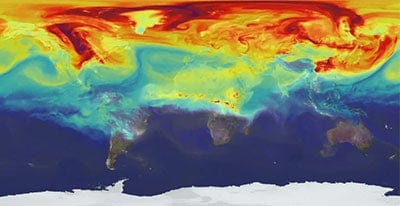Rarely do we encounter a scientific fact that stirs public controversy and distrust in science as much as climate change. However, the theory is built on honest reporting of facts. This emerges from a new study from Lund University in Sweden.
The study in question investigates whether there is a so-called publication bias within climate research, i.e. a statistically skewed distribution of the way various types of findings are presented in research journals. “Our study is a very large review of the publication record within climate change”, says Johan Hollander, who is a researcher at Lund University’s Faculty of Science in Sweden. The conclusion is that climate researchers do not conceal uncomfortable facts which could potentially disprove climate change.
Together with colleagues from Sweden and Canada (Christian Harlos and Tim C. Edgell), Hollander investigated 120 research articles published in the field of climate research between 1997 and 2013. Hollander’s study contains a statistical analysis of a total of 1154 experiments reported in the investigated articles. But, as mentioned, he did not find any omission of results that could challenge the theory of climate change.
However, Hollander and his team did find widespread selective reporting, which is likely common across many fields of science: large, statistically significant results were typically reported up front, whereas smaller and nonsignificant results were more often found in the technical results sections of papers.
“It was gratifying to see that the scientific method is robust. It is important to show that we can trust the results of climate research, even if more work is needed about how those results are reported”, says Johan Hollander.
Within the research community, there is a consensus on global climate change, whereas there are still many climate deniers among politicians and in some sections of the general public, according to Johan Hollander. After the so-called Climategate scandal in 2009, the legitimacy of climate change science came into question. Climate researchers were accused of fabricating results to fund a self-serving research enterprise.
“It is a major problem if politicians and other decision-makers don’t trust science, or don’t understand how scientists communicate their results. This can lead to important decisions not being taken, or being given lower priority”, says Johan Hollander.



@Paul M: Read up on how publication bias is detected. Pretty cool (and sound) statistical methods.
Conspiracy Ideation: Funding does not go to scientists looking for the truth about global warming.
No Nobel Prize for getting it wrong.
Assuming the results are available then it is possible to detect if some are omitted in the analysis.
It is more difficult to see when a clever crook has entirely fabricated the results. Haven’t a few deniers tried?
More would be gained from looking into the bias of which proposals get funding and which don’t and therefore never get studied. When the vast majority of funding is going to scientists attempting to prove or back up AGW and none is going to scientists looking into the truth of the matter, what kind of research do you think you are going to get?
“he did not find any omission of results”
How would he have known whether authors had omitted results that didn’t fit with the theory?